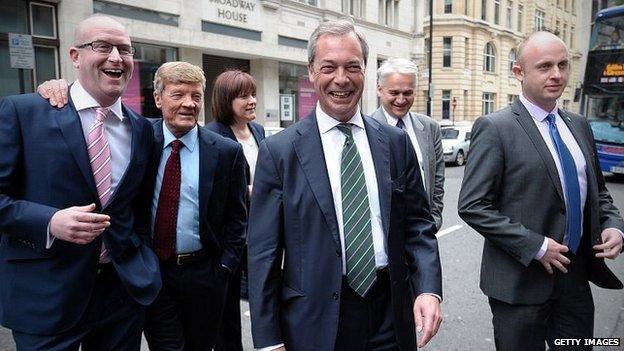UKIP - Where will it all end?
- Published

They call themselves the People's Army. They see themselves as leading a coup against the British establishment and they're not short of self belief.
"This is probably the most exciting moment in politics since the birth of the Labour Party," declared UKIP's deputy leader Paul Nuttall as he and Nigel Farage stood in front of UKIP's infantry - 22 newly elected MEPs
Having moved on Strasbourg and Brussels they've now set their sights on Westminster.
The obstacles in their way are as great as any they've yet faced. The first-past-the-post voting system will force UKIP to build a bigger coalition than they have assembled so far.
They will face questions about policies as yet undeveloped and on which their members disagree. Just one example - Mr Nuttall has praised the privatisation of NHS services. Mr Farage says he disagrees.
Will this election mark the start of a long march towards power, as UKIP hopes, or, as their enemies believe, will it be their greatest ever, but their last, significant victory? No-one can know.
What is clear is that this result has already triggered a bout of soul searching in the other parties.
Lib Dems are asking themselves - if we don't change leader what can we do to recover?
Labour are arguing behind the scenes about how seriously to take the incursion into their own heartlands.
The Tories are debating how much further they need to go in spelling out plans for EU reform and the control of immigration.
Even if this is not UKIP's breakthrough moment, this election has already changed a great deal.